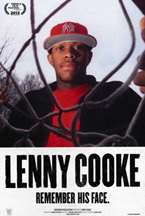LEGEND OF JIMMY THE GREEK, THE
(Part of its new 30 For 30 series, The Legend of Jimmy the Greek premieres on ESPN tonight—Tuesday, November 10th, 2009—at 8pm, followed by more airings on various ESPN channels over the next few months. Go here for details.)
After the disappointment of last week’s 30 For 30 selection, Without Bias, it felt good to sit down with a subject that I didn’t have an unfairly personal connection to. Don’t get me wrong, growing up as a sports-obsessed adolescent, every Sunday during the football season was Christmas Day thanks to the CBS pregame show The NFL Today. I just loved me some Brent Musberger, Irv Cross, Phyllis George, and, most of all, good ol’ Jimmy “The Greek” Snyder, who delivered his weekly picks with the cranky authority of a bona fide gangster. I was obviously innocent and clueless back then, for I thought The Greek was just picking games to show off his prediction skills. I didn’t grasp the whole “high stakes gambling” concept. But watching Fritz Mitchell’s The Legend of Jimmy The Greek, a somber reflection on the life and downfall of Snyder, it becomes clear just how important a role he played in making sports gambling the institution that it is today.
In order to pay tribute to his larger-than-life subject, who rose from humble Ohio beginnings to become one of the most recognizable figures on national television from the mid-’70s to the mid-’80s, Mitchell adopts a stylish pose befitting a man who first made a splash in the casinos of Las Vegas. At first, I was very skeptical—to the point of almost checking out—of his decision to resurrect The Greek by allowing him to tell much of his own story in an artificially constructed noir-y voice-over that was accompanied by flashy footage of another Greek stand-in. But, somehow, I checked that knee-jerk instinct and went along for the ride, as it ultimately seemed like an appropriate stylistic choice for this particular subject.
Interviewing the main players on The NFL Today, as well as many of the higher ups at CBS, Mitchell perceptively illustrates the historical importance of Snyder’s hiring on that show, in which he brought gambling out of the whorehouses and into middle class living rooms across America. But what lingers is just how sad a story Snyder’s life ended up becoming. The incident is indelible for anyone who remembers it: Snyder, caught on camera in early 1988, speaking off-the-cuff about the unfair physical advantage of black athletes. His explanation was so ludicrous and uninformed that one had to assume he’d been drinking to excess, but it didn’t matter. He was saying those things, and that was that. The next day, he was fired. But whereas many individuals were able to apologize for past transgressions and restore their lives to some semblance of normalcy, Snyder’s image was forever scarred. He was ruined. He retreated to Las Vegas, where he struggled to find his next dollar, before succumbing to a heart attack in 1996.
Snyder’s never-to-be-had atonement becomes even more fascinating when one considers that he was a crass and arrogant man who traumatized George and drove her to tears just before airtime on one occasion, yet who also lost his mother to a freak family disaster and his own child to cystic fibrosis. A complicated life, to be sure, but one that Snyder often helped to complicate. As The Legend of Jimmy the Greek moves from one sad incident to the next, Mitchell pays respect to Jimmy’s life by exposing it as the Greek tragedy that it was.
— Michael Tully










